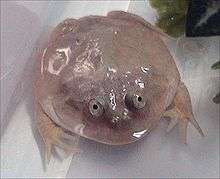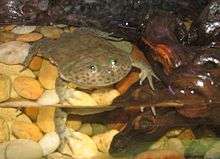Lepidobatrachus laevis
| Lepidobatrachus laevis | |
|---|---|
 | |
| Lepidobatrachus laevis in shallow water | |
| Scientific classification | |
| Kingdom: | Animalia |
| Phylum: | Chordata |
| Class: | Amphibia |
| Order: | Anura |
| Family: | Ceratophryidae |
| Genus: | Lepidobatrachus |
| Species: | L. laevis |
| Binomial name | |
| Lepidobatrachus laevis Budgett, 1899 | |
The Budgett's frog,[2] wide-mouth frog, or hippo frog[3] (Lepidobatrachus laevis, in Spanish escuerzo[1]) is a species of frog in the Ceratophryidae family.[2] It is often kept as a pet by mildly skilled amphibian keepers. The name "Freddy Krueger" frog also has been affectionately given due to their disturbing screech and aggression.[3]

Description

This frog has become popular in pet stores due its comical flat appearance and intelligent behavior. Females reach a size of 100 millimetres (3.9 in) while males sometimes only reach as half as large. They have a large head that makes up to 1/3 of the body, with notably an extremely large mouth. Their mouth contains a top row of teeth and two "fangs" on the lower jaw. They have extremely short and stubby limbs and the forelimbs are unwebbed. L. laevis is dark olive green with darker blotches outline in orange. The males have a dark blue throat.[4]
Diet and behavior
The wide-mouth frog is well adapted to its environment, notably the harsh winter. During this time it will remain inactive underground in a cocoon of shed dead skin which protects it from losing water and they emerge. This species is generally very aggressive and will puff up when threatened to appear larger, if this doesn't deter the annoyance they will make a shrill screech, bite, and corner the target.[5] This screeching behavior has caused it to have some extent of Internet popularity. This led to a meme where a photo of the frog was captioned with the phrase: "It is Wednesday, my dudes." They are nocturnal and hunt at night, submerged up to their nostrils and wait for prey to pass by, then they lunge and eat their meal whole. They feed on other frogs, insects, and snails.
Reproduction
L. laevis is noted for their fascinating reproductive biology, such as how a single mating produced up to 1400 eggs. A pair will reproduce in temporary pools of water. The embryo develops at a startling phase, in two weeks, in order to metamorphosis into adults before their breeding pool dries up.[5] The tadpoles are carnivores and cannibalistic at the time of hatching and have nearly adult jaws. They sexually mature in about a year.[6]
Distribution and conservation
It is found commonly in Paraguay and Bolivia, and rarely Argentina. Its natural habitats are dry and wet Chaco. Breeding takes place in temporary and artificial ponds. It is in some areas threatened by habitat loss but they have a large total population size.[1]
Captivity
These frogs are often kept by keepers with mild experience with frogs or advanced owners. A ten to twenty gallon tank is generally recommended, without aquarium gravel because it causes digestive issues. River stones are a better alternative. Rocks should be sloped to allow the frog to exit the water. They don't require special in houses with a comfortable temperature of about 72 degrees Fahrenheit. This species of frog needs to be kept alone or with members of the same species and of equal size, as they will consume anything smaller than themselves.[3]
| Wikimedia Commons has media related to Lepidobatrachus laevis. |
External links
- Care information for keeping Lepidobatrachus laevis in the home aquarium at the Aquarium Wiki
References
- 1 2 3 Aquino, L., De la Riva, I. & Céspedez, V. (2004). "Lepidobatrachus laevis". IUCN Red List of Threatened Species. Version 2014.3. International Union for Conservation of Nature. Retrieved 31 December 2014.
- 1 2 Frost, Darrel R. (2014). "Lepidobatrachus laevis Budgett, 1899". Amphibian Species of the World: an Online Reference. Version 6.0. American Museum of Natural History. Retrieved 31 December 2014.
- 1 2 3 "Budgett's Frog". Animal-World. Retrieved 9 February 2014.
- ↑ "Lepidobatrachus laevis". AmpihibiaWeb. Retrieved 9 February 2014.
- 1 2 Vellard, J. (1948). Batracios del chaco argentino. Acta Zoologica Lilloana, 5, 137-174.
- ↑ Faivovich, J. (1994). La distribución del género Lepidobatrachus (Budgett, 1899) (Leptodactylidae: Ceratophryinae). Acta Zoologica Lilloana, 43(1), 137-174.
